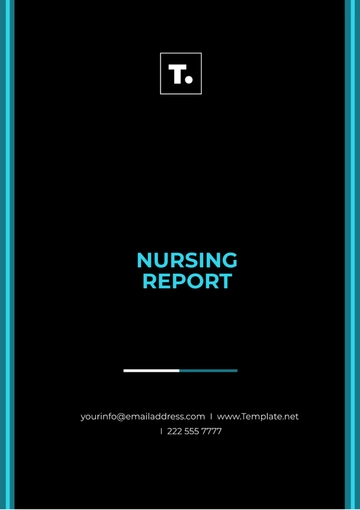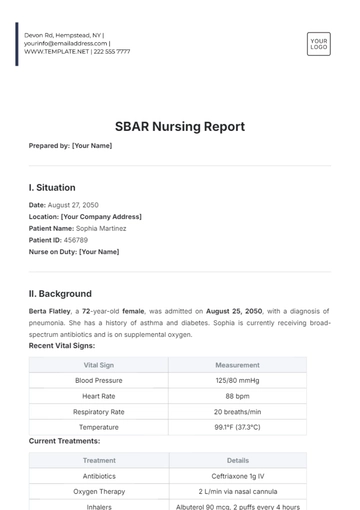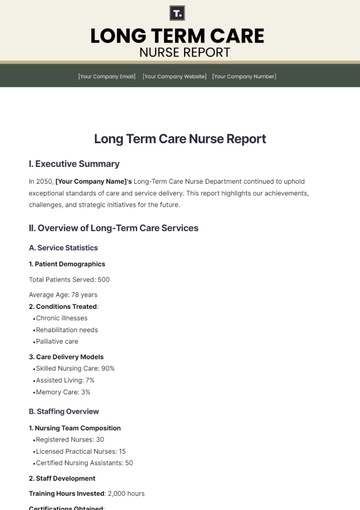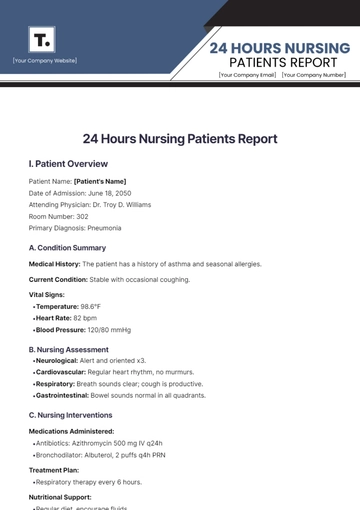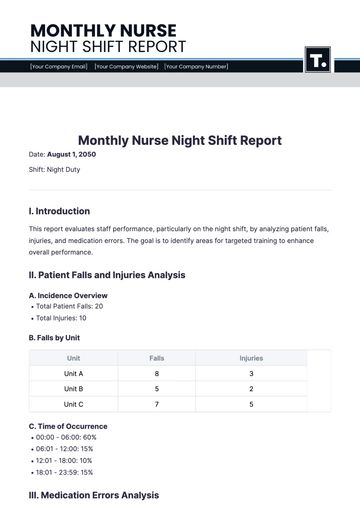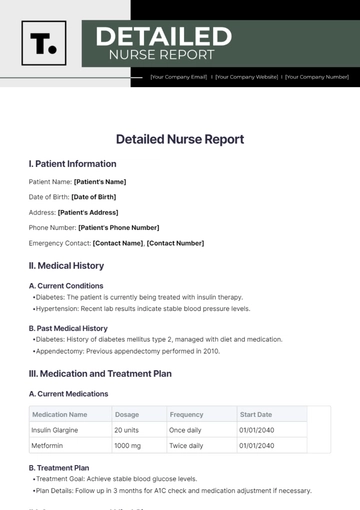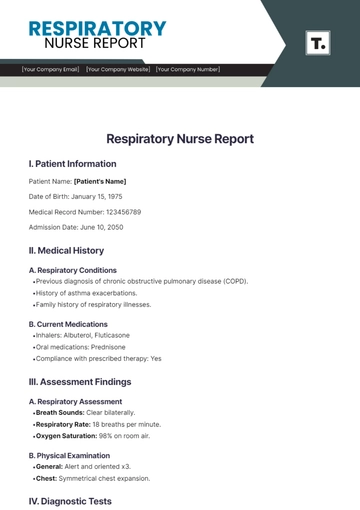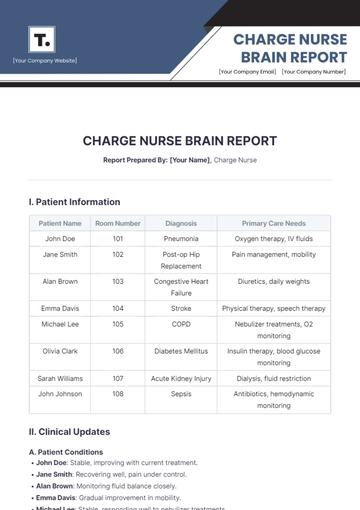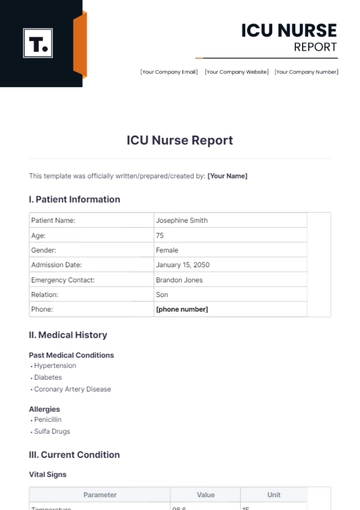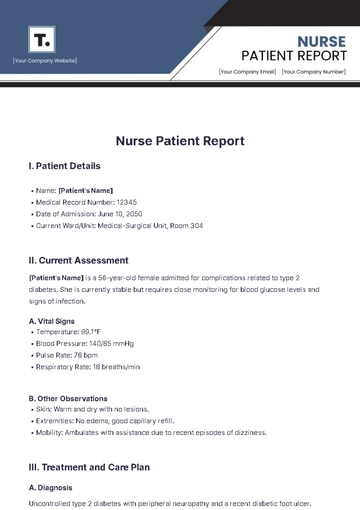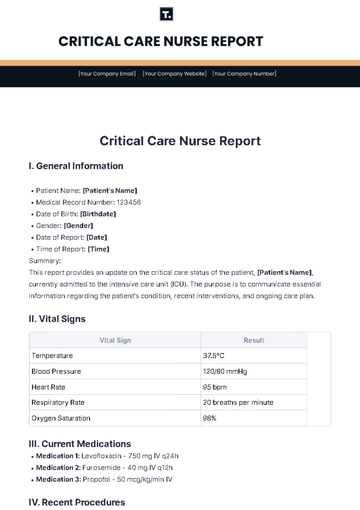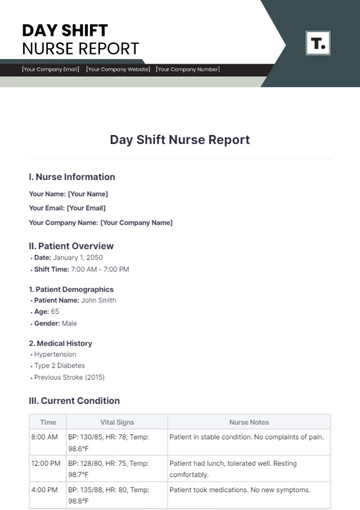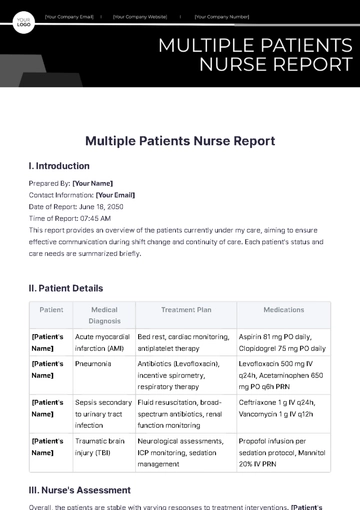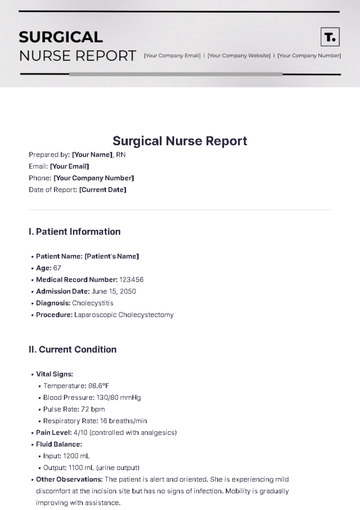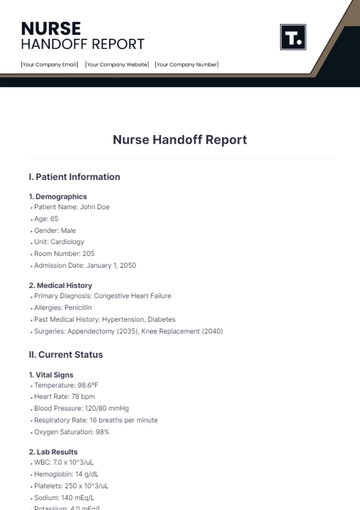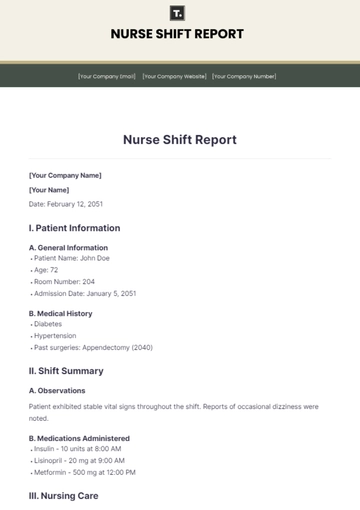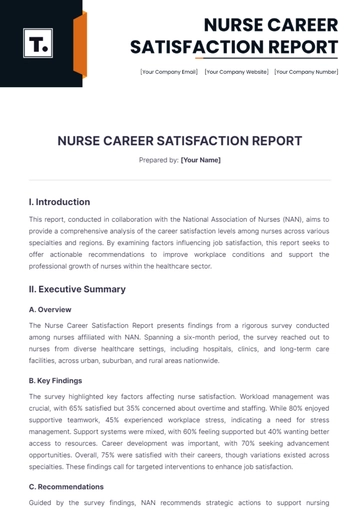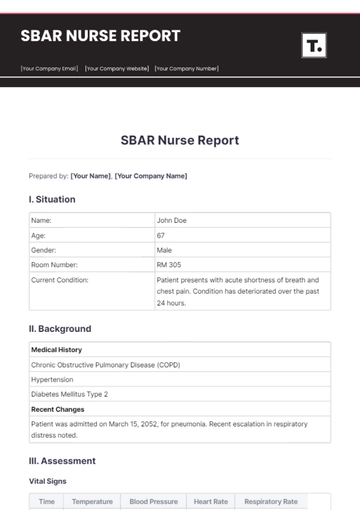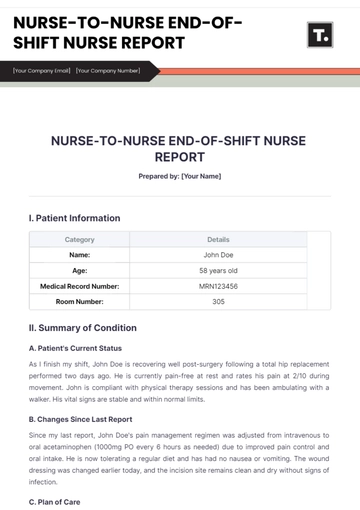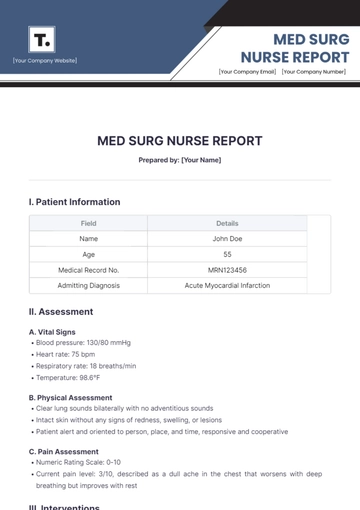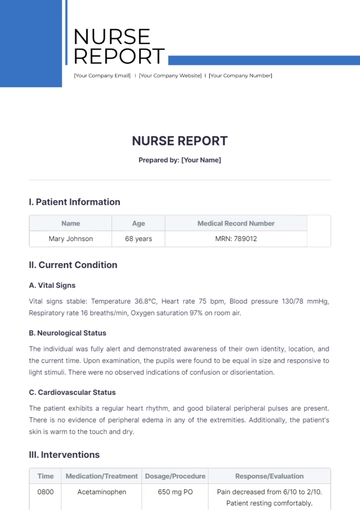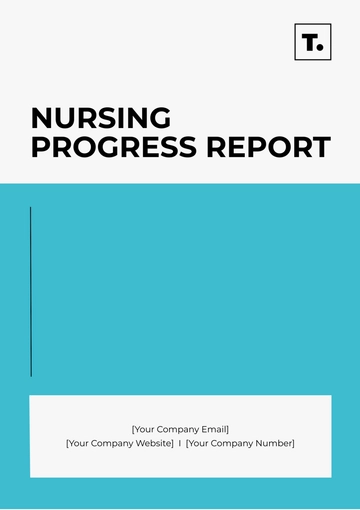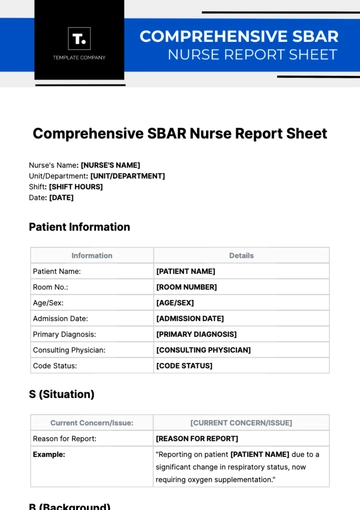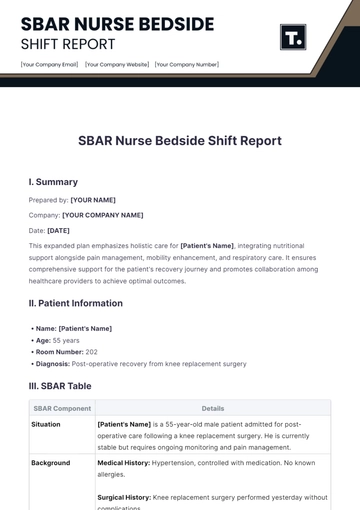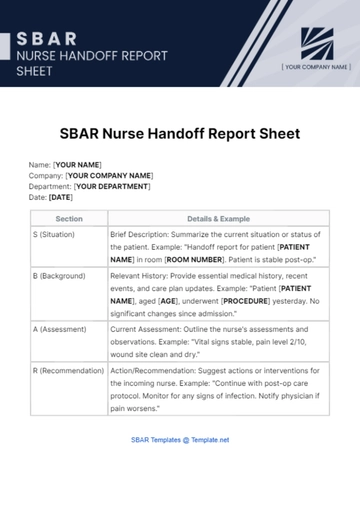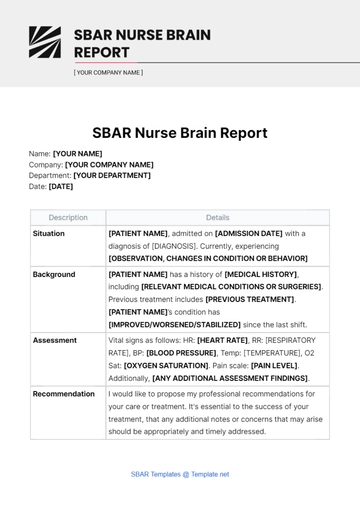Free Nurse Career Satisfaction Report
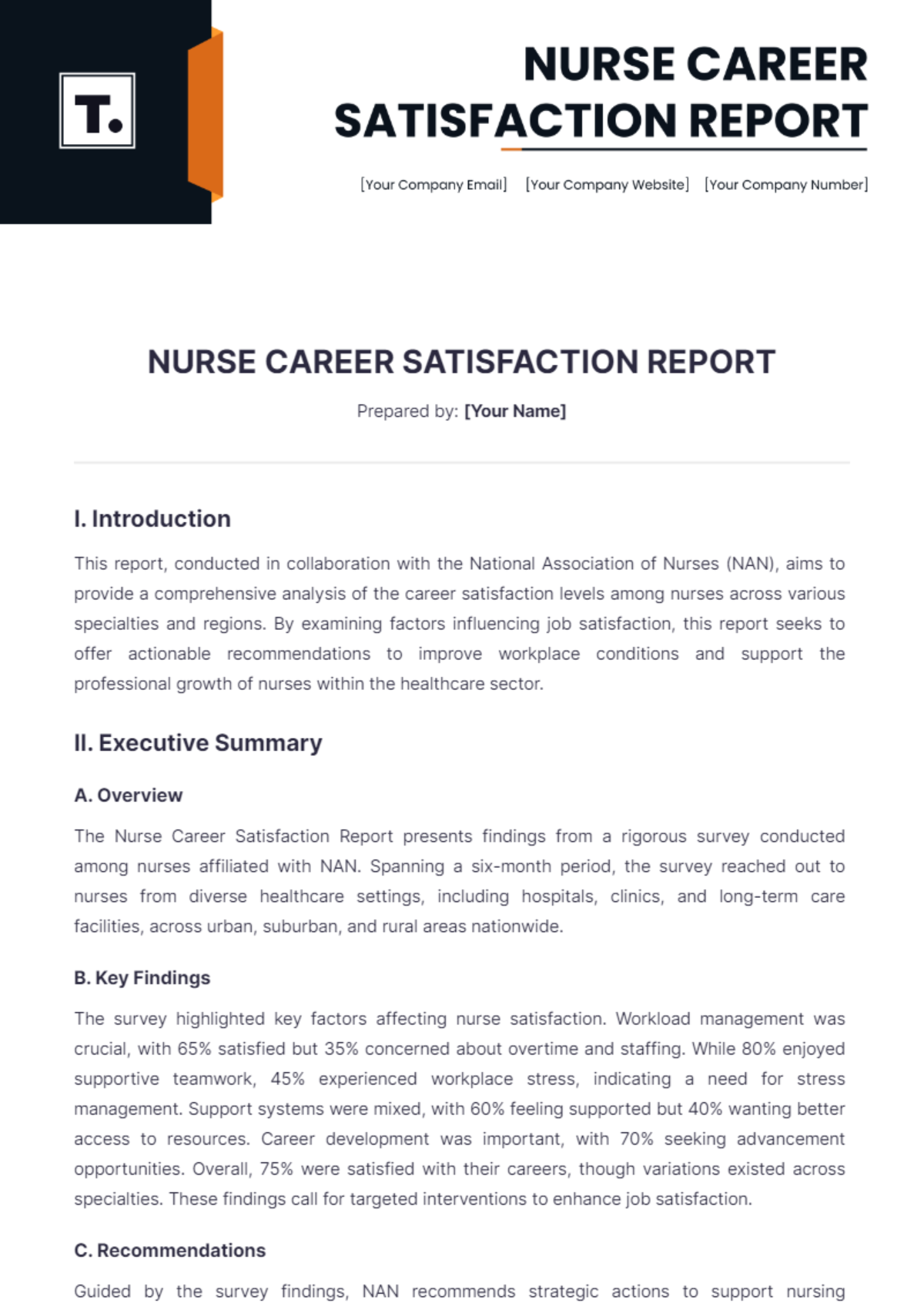
Prepared by: [Your Name]
I. Introduction
This report, conducted in collaboration with the National Association of Nurses (NAN), aims to provide a comprehensive analysis of the career satisfaction levels among nurses across various specialties and regions. By examining factors influencing job satisfaction, this report seeks to offer actionable recommendations to improve workplace conditions and support the professional growth of nurses within the healthcare sector.
II. Executive Summary
A. Overview
The Nurse Career Satisfaction Report presents findings from a rigorous survey conducted among nurses affiliated with NAN. Spanning a six-month period, the survey reached out to nurses from diverse healthcare settings, including hospitals, clinics, and long-term care facilities, across urban, suburban, and rural areas nationwide.
B. Key Findings
The survey highlighted key factors affecting nurse satisfaction. Workload management was crucial, with 65% satisfied but 35% concerned about overtime and staffing. While 80% enjoyed supportive teamwork, 45% experienced workplace stress, indicating a need for stress management. Support systems were mixed, with 60% feeling supported but 40% wanting better access to resources. Career development was important, with 70% seeking advancement opportunities. Overall, 75% were satisfied with their careers, though variations existed across specialties. These findings call for targeted interventions to enhance job satisfaction.
C. Recommendations
Guided by the survey findings, NAN recommends strategic actions to support nursing professionals and enhance career satisfaction:
Workload Management: Advocate for evidence-based workload management policies to optimize staffing levels and reduce burnout among nurses.
Support Systems Enhancement: Collaborate with healthcare institutions to strengthen support systems, including mental health resources, peer support networks, and leadership development programs.
Career Development: Develop and promote structured career pathways tailored to diverse nursing specialties, ensuring equitable access to educational resources and professional growth opportunities.
III. Methodology
A. Survey Design
The survey instrument was collaboratively designed by NAN and industry experts to capture comprehensive data on nurse satisfaction. It included Likert-scale questions, open-ended responses, and demographic inquiries to gather quantitative and qualitative insights.
B. Data Collection
A targeted approach was employed to reach 5,000 nurses affiliated with NAN through email invitations and social media platforms. The survey remained open for three months to ensure a broad representation of experiences and perspectives from nurses across different demographics and practice settings.
C. Data Analysis
Data analysis utilized advanced statistical techniques and qualitative methods to interpret survey responses effectively. Statistical software such as SPSS was employed to analyze quantitative data, while thematic analysis was used to identify recurring themes and insights from qualitative responses.
IV. Key Findings
Aspect of Job Satisfaction | Findings |
|---|---|
Workload | Nurses reported moderate satisfaction with workload management, highlighting areas for improvement in reducing overtime and optimizing staffing levels effectively. |
Work Environment | Positive feedback on collaborative work environments and teamwork, with concerns over workplace stress and the impact of heavy workloads on morale. |
Support Systems | Mixed perceptions on support systems, indicating variability in access to resources, mentorship, and opportunities for professional growth. |
Career Development Opportunities | High demand for professional growth opportunities, particularly in specialized fields, underscoring the need for structured career paths and mentorship programs. |
Overall Satisfaction | Overall satisfaction levels were generally positive, yet disparities existed among different nursing specialties, suggesting targeted interventions to address specific concerns. |
V. Discussion
A. Strengths
The report highlights several strengths within the nursing profession, including a strong sense of professional camaraderie, dedication to patient-centered care, and a commitment to continuous learning despite operational challenges.
B. Challenges
Challenges such as workload management, workplace stress, and disparities in career development opportunities were identified as critical areas needing focused interventions to enhance overall job satisfaction and retention rates among nurses.
C. Implications
The findings underscore the importance of strategic initiatives to enhance workplace support, promote career advancement opportunities, and prioritize mental health and well-being initiatives among nurses. Addressing these implications will contribute to building a resilient healthcare workforce capable of delivering high-quality patient care.
VI. Recommendations
Based on the insights gathered, NAN recommends the following actions to improve nurse career satisfaction and well-being:
Advocate for Workload Management Policies: Champion the adoption of evidence-based workload management policies to mitigate burnout and optimize nursing practice efficiency.
Enhance Support Systems: Collaborate with healthcare institutions to enhance support systems, including access to mental health resources, peer support networks, and leadership development programs tailored to nursing professionals.
Promote Career Development: Develop and promote structured career pathways aligned with the evolving needs of nursing specialties, ensuring equitable access to continuing education and professional growth opportunities.
VII. Conclusion
In conclusion, the Nurse Career Satisfaction Report provides a comprehensive assessment of nurse satisfaction levels, reflecting the collective voice of nurses affiliated with NAN. By addressing identified challenges and implementing evidence-based recommendations, NAN aims to empower nurses, strengthen the nursing profession, and ultimately enhance patient outcomes across healthcare settings. The findings of this report serve as a foundation for ongoing dialogue and collaborative efforts to improve nurse well-being and career satisfaction in the evolving healthcare landscape.
- 100% Customizable, free editor
- Access 1 Million+ Templates, photo’s & graphics
- Download or share as a template
- Click and replace photos, graphics, text, backgrounds
- Resize, crop, AI write & more
- Access advanced editor
Discover career insights with the Nurse Career Satisfaction Report Template from Template.net. This editable and customizable template is tailored for nurses seeking clarity and improvement. Crafted to be editable in our Ai Editor Tool, it offers precise customization to reflect your unique career journey. Unlock professional growth today with this essential resource.
You may also like
- Sales Report
- Daily Report
- Project Report
- Business Report
- Weekly Report
- Incident Report
- Annual Report
- Report Layout
- Report Design
- Progress Report
- Marketing Report
- Company Report
- Monthly Report
- Audit Report
- Status Report
- School Report
- Reports Hr
- Management Report
- Project Status Report
- Handover Report
- Health And Safety Report
- Restaurant Report
- Construction Report
- Research Report
- Evaluation Report
- Investigation Report
- Employee Report
- Advertising Report
- Weekly Status Report
- Project Management Report
- Finance Report
- Service Report
- Technical Report
- Meeting Report
- Quarterly Report
- Inspection Report
- Medical Report
- Test Report
- Summary Report
- Inventory Report
- Valuation Report
- Operations Report
- Payroll Report
- Training Report
- Job Report
- Case Report
- Performance Report
- Board Report
- Internal Audit Report
- Student Report
- Monthly Management Report
- Small Business Report
- Accident Report
- Call Center Report
- Activity Report
- IT and Software Report
- Internship Report
- Visit Report
- Product Report
- Book Report
- Property Report
- Recruitment Report
- University Report
- Event Report
- SEO Report
- Conference Report
- Narrative Report
- Nursing Home Report
- Preschool Report
- Call Report
- Customer Report
- Employee Incident Report
- Accomplishment Report
- Social Media Report
- Work From Home Report
- Security Report
- Damage Report
- Quality Report
- Internal Report
- Nurse Report
- Real Estate Report
- Hotel Report
- Equipment Report
- Credit Report
- Field Report
- Non Profit Report
- Maintenance Report
- News Report
- Survey Report
- Executive Report
- Law Firm Report
- Advertising Agency Report
- Interior Design Report
- Travel Agency Report
- Stock Report
- Salon Report
- Bug Report
- Workplace Report
- Action Report
- Investor Report
- Cleaning Services Report
- Consulting Report
- Freelancer Report
- Site Visit Report
- Trip Report
- Classroom Observation Report
- Vehicle Report
- Final Report
- Software Report
